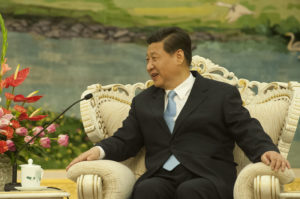
Secretary of Defense Leon E. Panetta meets with Chinese Vice President Xi Jinping prior to a meeting in Beijing China, Sept. 19, 2012. Panetta visited Tokyo, Japan before continuing to Beijing and traveling to Auckland, New Zealand on a week long trip to the Pacific. DoD photo by Erin A. Kirk-Cuomo
Pat Buchanan writes on his blog, Buchanan.org:
Writing in The Wall Street Journal Friday, Kissinger declared that it is now an imperative that the world’s leaders, even as they deal with the raging pandemic, begin to make the “transition to the post-coronavirus order.”
“Failure to do so could set the world on fire.”
Yet, the ingredients Kissinger considers essential for establishing that new world order appear, like ventilators, to be in short supply.
“Sustaining public trust,” asserts Kissinger, “is crucial … to international peace and stability.”
But how do we trust again our adversary China, after its criminal cover-up of the menace and magnitude of the virus unleashed in Wuhan?
How do we trust again this regime that was, until recently, blaming the coronavirus on U.S. Army troops visiting Wuhan?
Observing governments thrashing about in the crisis, the phrase that comes to mind is not “public trust” as much as “every nation for itself.
Last week, the EU’s Court of Justice ruled that Poland, Hungary and the Czech Republic broke EU law by refusing to relocate refugees during the migrant crisis in 2015. The three nations offered no apologies.
When Donald Trump’s issued his Jan. 31 travel ban on those who had recently been in China, candidate Joe Biden denounced Trump for “hysterical xenophobia and fearmongering.”
Biden now thinks Trump did the right thing.
If you’re willing to fight for Main Street America, click here to sign up for my free weekly email.




